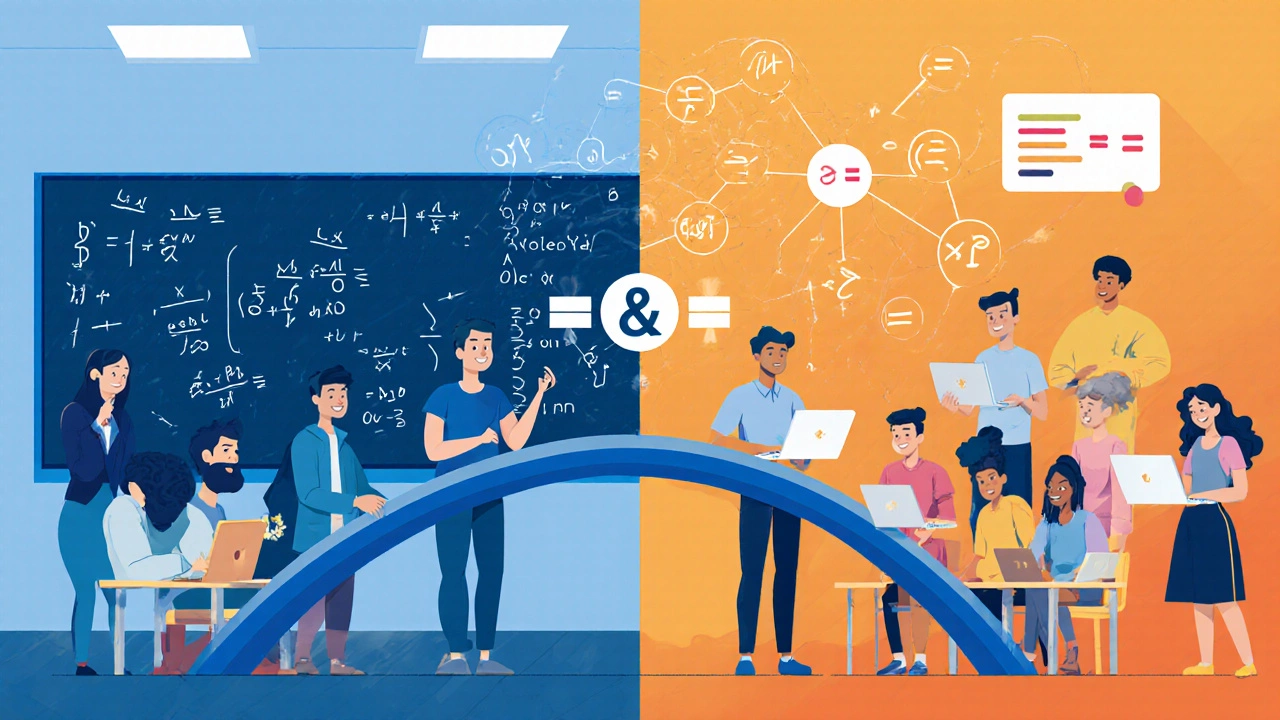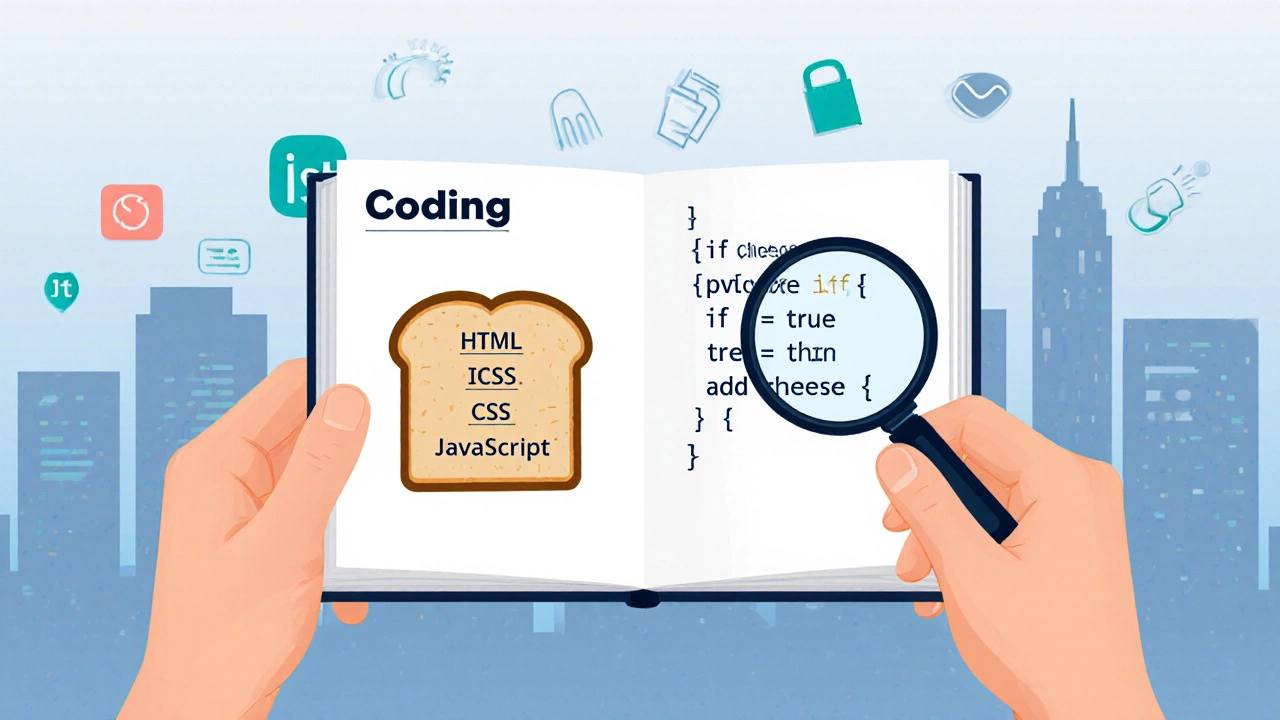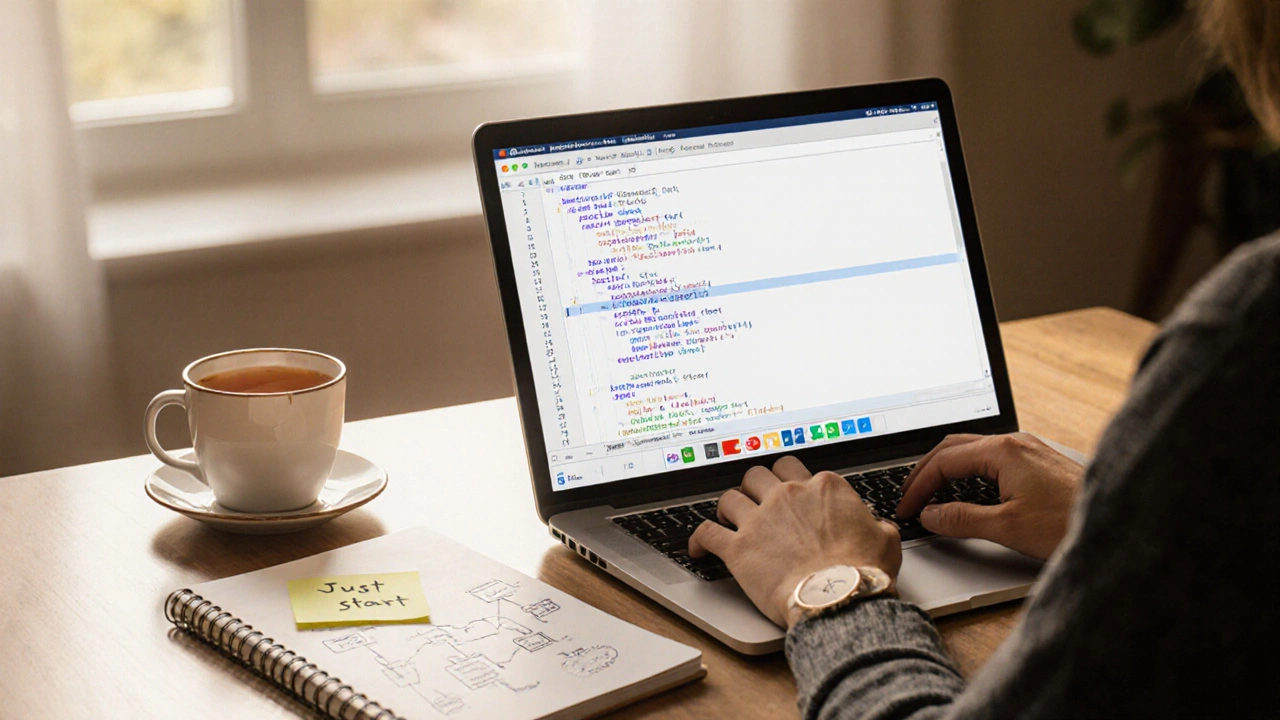Coding Math Requirement Calculator
Calculate Your Math Needs
Based on your focus and experience, 82% of your daily tasks will use basic math only.
Advanced math (like calculus or linear algebra) is rarely needed in your field.
People often think you need to be a math genius to code. You see videos of programmers solving complex equations, hear stories about algorithms and data structures, and assume you’re left behind if you struggled with algebra. But here’s the truth: coding doesn’t require advanced math for most real-world tasks. You don’t need to solve calculus problems to build a website, automate a spreadsheet, or create a mobile app. What you do need is problem-solving patience and the willingness to learn step by step.
What Kind of Math Do Coders Actually Use?
Most coders use math at a basic level-addition, subtraction, multiplication, division, and maybe percentages. Think about it: if you’re building a shopping cart, you’re adding prices. If you’re tracking user logins, you’re counting. If you’re adjusting font sizes in CSS, you’re working with pixels and ratios. That’s it.
Some areas of programming do need heavier math:
- Game development: physics engines, 3D rotations, vector math
- Data science and machine learning: statistics, linear algebra, probability
- Computer graphics and animation: trigonometry, matrices
- Cryptography: number theory, modular arithmetic
But these are niche fields. Over 80% of coding jobs-web development, mobile apps, business software, automation scripts-don’t touch any of this. You can work at companies like Shopify, Airbnb, or Dropbox for years without opening a textbook on calculus.
Why Do People Think Math Is Required?
The myth comes from two places: academia and outdated curricula.
Many university computer science programs start with heavy math because they’re designed to train researchers, not software engineers. You’ll see courses like Discrete Mathematics, Linear Algebra, and Calculus listed as prerequisites. But those are for people who want to build new algorithms or work in AI labs-not for people who want to build websites or fix bugs in an app.
Bootcamps and online coding classes (like freeCodeCamp, Codecademy, or The Odin Project) don’t require math beyond high school level. They focus on logic, structure, and repetition. You learn by doing: writing code, breaking it, fixing it, and doing it again. That’s how most professional developers learned.
What You Really Need: Logic, Not Formulas
Programming is less about math and more about thinking clearly. It’s about breaking big problems into small steps. For example:
- You want to sort a list of names alphabetically? That’s not math-it’s a sequence of comparisons.
- You want to check if a user’s password is strong? That’s checking length, symbols, and numbers-not solving an equation.
- You want to display different content based on the time of day? That’s an if-else statement, not a formula.
These are logical patterns. You don’t need to know the Pythagorean theorem to write an if-statement. You just need to understand: if this, then that.
Think of coding like cooking. You don’t need to be a food scientist to make a good sandwich. You need to know what ingredients go together, when to heat them, and how to fix it if it’s too salty. Same with code. You learn the tools, the patterns, and how to debug when things go wrong.
Real Examples: People Who Succeeded Without Strong Math Skills
Take Sarah, a freelance web developer in Austin. She dropped out of community college after failing calculus. She started learning HTML and CSS on YouTube. Within six months, she was building landing pages for small businesses. Today, she earns more than her engineer friends who spent years on advanced math.
Or Jamal, who worked in retail and taught himself JavaScript to automate his inventory spreadsheets. He didn’t know what a quadratic equation was. But he learned how to loop through rows, use conditional formatting, and connect to an API. Now he’s a junior developer at a SaaS company.
These aren’t outliers. They’re the majority. The tech industry hires people who can solve problems, not people who can derive equations.

What Math Should You Learn If You’re Starting Out?
If you’re worried about gaps, here’s what’s actually useful:
- Basic arithmetic: adding, subtracting, multiplying, dividing
- Percentages: for calculating discounts, growth rates, or UI scaling
- Boolean logic: true/false, AND/OR/NOT (this is the core of all programming decisions)
- Basic algebra: solving for x, understanding variables (you’ll use this when renaming variables in code)
- Understanding coordinates: x and y positions on a screen (useful for web and game dev)
That’s it. You can learn all of this in under 10 hours. Many free resources like Khan Academy’s Computer Programming section or freeCodeCamp’s JavaScript Algorithms and Data Structures course include just enough math to get you going-no calculus required.
What If You Want to Work in AI or Game Development?
That’s fine. But you don’t need to know it before you start coding. Start with the basics. Build a few projects. Get comfortable with writing code. Then, if you find yourself drawn to AI, robotics, or graphics, you can learn the math as you go.
Most people learn advanced math for programming in context. For example:
- You’re building a recommendation engine? You’ll learn statistics because you need to understand correlation and clustering.
- You’re making a 2D game? You’ll pick up trigonometry when you need to rotate sprites or calculate angles.
You learn it because you need it-not because someone told you to memorize it first.
Common Misconceptions About Math and Coding
Here are the myths you need to unlearn:
- Myth: You need to be good at math to understand algorithms. Truth: Algorithms are step-by-step instructions. They’re like recipes. You don’t need to know how the oven works to bake a cake.
- Myth: If you’re bad at math, you’ll fail coding bootcamps. Truth: Bootcamps have dropout rates around 20-30%. Less than 5% of those dropouts are because of math. Most quit because they got stuck on a bug and gave up.
- Myth: All programmers are math wizards. Truth: Most programmers are just persistent problem-solvers who Google errors daily.

How to Start Coding Without Worrying About Math
Here’s a simple plan to begin:
- Choose one beginner-friendly language: JavaScript (for websites), Python (for automation or data), or Ruby (for web apps).
- Use a free platform: freeCodeCamp, The Odin Project, or Codecademy’s free track.
- Build one small project: a to-do list, a simple calculator, a personal bio page.
- Break problems into tiny steps. Don’t try to code everything at once.
- When you get stuck, search for the error message. Stack Overflow exists for a reason.
- Repeat. Every week, build something new-even if it’s small.
After three months, you’ll be surprised at how much you’ve learned. And you won’t even remember worrying about math.
Final Thought: Coding Is a Skill, Not a Test
You don’t need to be good at math to code. You need to be willing to try, fail, and try again. The people who succeed in coding aren’t the ones with the highest math scores. They’re the ones who kept going when the code broke. They’re the ones who asked for help. They’re the ones who didn’t quit because they thought they weren’t "smart enough."
Start today. Don’t wait until you "feel ready." You’ll learn what you need as you go.
Do I need a math degree to become a programmer?
No. Most programming jobs don’t require a math degree. Employers care more about your ability to solve problems, write clean code, and learn new tools. Degrees in computer science often include math because they’re academic, but many successful developers have degrees in art, history, or even no degree at all.
Can I learn to code if I failed math in school?
Absolutely. Many people who struggled with math in school become excellent coders. Coding relies on logic and repetition, not test-taking skills. If you can follow instructions, pay attention to detail, and keep trying when things don’t work, you can learn to code.
What if I want to work in data science or AI later?
You can start coding now and learn the math later. Most data science courses teach the necessary statistics and linear algebra alongside Python or R. You’ll learn the math when you need it to solve real problems-not before you’ve even written your first line of code.
Are there coding jobs that don’t use math at all?
Yes. Front-end web development, content management systems, mobile app UIs, and business automation tools rarely require math beyond basic arithmetic. You’ll use logic, not formulas, to build buttons, forms, menus, and workflows.
How much math do I need for a coding bootcamp?
Almost none. Most bootcamps assume you have high school-level math at most. They focus on teaching programming logic, debugging, and project building. If you can count to 10 and understand what "if" and "else" mean, you’re ready to start.
Next Steps: What to Do Right Now
If you’re ready to start coding but still worried about math:
- Go to freeCodeCamp.org and complete the first five lessons in their JavaScript course.
- Write down one small project idea-something you wish existed, like a habit tracker or a movie list.
- Set a timer for 15 minutes and try to code it. Don’t worry if it’s messy. Just start.
- Bookmark Stack Overflow and Google. You’ll use them more than your textbooks.
You don’t need to be good at math to code. You just need to start.

